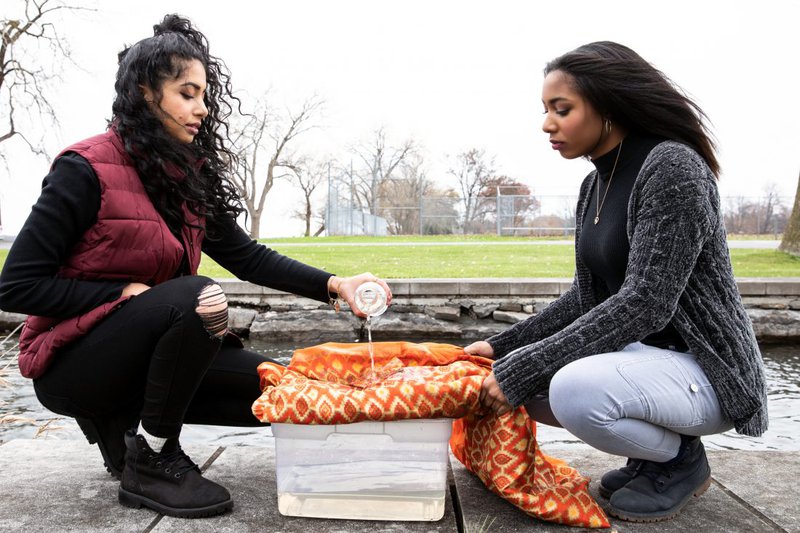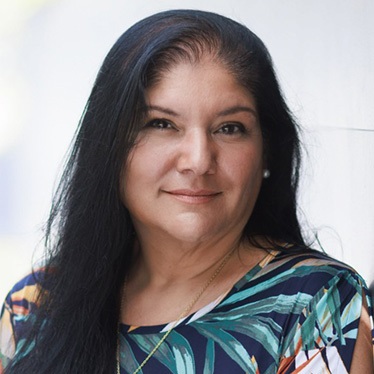
Student Spotlight: Technology Wrapped in Tradition
January 17, 2020
SU News
Student entrepreneurs Nikita Chatterjee and Brianna Howard seek to reduce waterborne illnesses in India through an innovative filtration system that incorporates a customary practice.
When Nikita Chatterjee ’20 and Brianna Howard ’20 embarked on a project in fall 2018 to reduce waterborne illnesses in low-income communities in India, they came up with a simple, yet elegant solution that wraps technology in tradition. They envisioned incorporating a water filtration system into a sari—the traditional garment worn by Indian women, who also use it to filter water—and went to work. “We wanted a system that was going to fit the behavioral needs of the women in the community who collect the water,” says Howard, a public health major in the David B. Falk College of Sport and Human Dynamics .
Since then, the social entrepreneurs have created a prototype, filed a provisional patent application, won several business competitions and founded a global health company that aims to provide access to clean water. They named it PAANI , the Hindi word for water. “We’re focused on empowering Indian women because collecting and filtering water has been a gender-specific role in India,” says Chatterjee, an economics major in the College of Arts and Sciences and Maxwell School of Citizenship and Public Affairs . “They’ve been using the sari to filter water for centuries, so it’s familiar to them. We don’t want to go in and take over and remove a tradition, we want to embrace it and infuse it with technology. It’s really important for us to emphasize tradition and culture along with advancement in technology because you can have both at the same time.”
Chatterjee and Howard conceived of the idea while Chatterjee was participating in a women’s entrepreneurship program that challenged the students to address an issue in a low-income community and find a solution for it. She is the daughter of Indian immigrants and has traveled to India on family visits, so she was well aware of the water quality issues. Her mother always warned her not to drink the water there unless her grandmother gave it to her or it was in a sealed bottle. Otherwise, she’d get sick. “We have found that over 163 million people are living without access to clean water in India,” Chatterjee says.
“It’s really important for us to emphasize tradition and culture along with advancement in technology because you can have both at the same time. ... We want the women of India to become the heroes of their own story.”
Nikita Chatterjee '20 B.A. (Econ)
Brainstorming and Building a Prototype
Both Chatterjee and Howard are first-generation college students who arrived at Syracuse University as pre-med majors before pursuing other health-related paths. They became friends through shared classes and studying together. In their junior year, they were roommates and decided to go all out on developing the water filtration system. They turned to Linda Dickerson Hartsock, executive director of the Blackstone LaunchPad powered by Techstars , the University’s student innovation hub. Hartsock’s guidance proved crucial to them: They brainstormed at the LaunchPad, and she worked with them on developing the idea and the company’s name. “Linda helped us set a foundation for what the company would look like, and there were a lot of things we had to learn,” Howard says. “We are very grateful to Linda.”
Hartsock also directed them to Invent@SU , a summer program that immerses students in the invention process, from idea to design to prototype to pitch. Although they had their idea and the groundwork for a business, they’d never built anything from scratch. “Invent@SU was a resource for us to learn the software skills we needed and to see what goes into engineering this water filter,” Chatterjee says. “That’s benefited us a lot because we know every single technical thing about our device since we literally built it, so that was really cool.”
The prototype features a sari about five feet long (saris are typically 10 to 15 feet in length) with four pockets—three are filled with water filters containing disinfectants and one has a built-in sensory mechanism. It’s folded horizontally twice, stacking the pouches on top of each other. The sari is then placed over a container—pour water on it and the filtration process is underway. When any of the disinfectants get low, the sensor releases a henna dye that creates an X mark on the sari, alerting the user that the filters are used up. While a folded sari alone can filter out cholera and debris, the disinfectants eliminate harmful bacteria and other microcontaminants that cause typhoid, jaundice, diarrhea and other waterborne illnesses. “We made the sari smaller so women can still throw it over their shoulder or wrap it around their head if they’re walking to collect water,” Chatterjee says.
A panel of Invent@SU judges awarded PAANI first place and a $5,000 prize in the campus competition. It wasn’t their first prize-winning recognition. Last April, at the New York Business Plan Competition, they received the Minority and Women Owned Business Enterprise Excellence Award and a $2,000 prize. In October, they collected first place and $7,000 in the ’Cuse Tank entrepreneurial competition hosted by the LaunchPad. In November, they won the $5,000 first prize at the Impact Prize competition sponsored by the LaunchPad as part of Global Entrepreneurship Week, and they also won the second prize of $2,000 at the Entrepreneurs’ Organization’s Global Student Entrepreneurship competition in Buffalo. In addition, they were awarded a $5,000 grant from The SOURCE (Syracuse University’s Office of Undergraduate Research and Creative Engagement) for the 2019-20 academic year. This funding will enable them to travel to India to conduct further research, sample water supplies and develop second-stage prototypes for further testing and design iterations.
“Nikita and Brianna are building a high-impact venture with an important mission,” Hartsock says. “Through a powerful partnership between Invent@SU and the LaunchPad, we are providing meaningful connections to a campus ecosystem and global network that is guiding them through product and business development. They are smart, talented founders who are sincerely committed to building this culturally appropriate clean water solution to improve public health outcomes. We look forward to continuing to work with them through their senior year and beyond to help bring their idea to life.”
Along the way, they’ve consulted with experts for guidance, including Svetoslava Todorova G’04, G’11, G’12, a civil and environmental engineering professor of practice in the College of Engineering and Computer Science , and Neil Murphy G’70, president emeritus of SUNY College of Environmental Science and Forestry . They’ve also invested their winnings in the company, hiring an engineer and building collaborations in India. Focusing on the Dharavi section of Mumbai, they connected with an NGO, Pragati Holistic Development Trust, to perform a public health survey and with researchers at the Indian Institute of Technology to collect water samples. “We put a lot of our personal time into this, working toward something that we know can be big, and we’re using the resources the University has provided us,” Howard says. “We can reach out to all these different people. We emphasize the importance of making connections and networking with people who will put us in the position we need to be in.”
Commitment to Health Care
As the two point out, water quality is a universal issue that affects communities not just in India, but in Syracuse, throughout the United States and elsewhere around the world. They want to raise awareness about this global problem, and that’s no surprise because both Chatterjee and Howard are committed to making a difference in people’s lives. Both cite courses and involvement in the Syracuse community as experiences that have inspired them. Chatterjee was a member of Syracuse University Literacy Corps and tutored kindergartners and first-grade students. “Uplifting these students to help them succeed was a great feeling,” she says. “I genuinely enjoyed being part of an organization that saw the importance of giving back to the community.” She also found a pathway that merged her interest in health care and business through the course Economics of Health and Medical Care. “It introduced me to a new world that I could exist in between health and business,” she says.
Howard’s passion for health and health care was nourished through several public health classes, particularly one devoted to refugees and health. It paired her with an immigrant family from Eritrea whom she helped with doctor visits and educational and job opportunities. “I was glad to have that shared experience,” she says. “It exposed me to the realities that many refugees and their children face as they create their new home in Syracuse.”
When asked what it means to be Orange, they both respond with answers that reflect the drive and passion that have propelled them on their journey with PAANI. Chatterjee refers to the University motto—“Knowledge crowns those who seek her”—and says, “You continue being a student in every space you’re in. It means you never stop seeking knowledge. As a student at Syracuse University, I have learned the importance of being open-minded to different perspectives, experiences, beliefs and cultures.”
For Howard, being Orange means “to be unique—to stand out from the crowd and be proud of doing so,” she says. “We all come from different backgrounds, so to be Orange is to unite and come together despite all of our differences, emphasizing the importance and power of working together.”
As they look to PAANI’s future, they want to build support for their device from hospitals and other health organizations in India. Noting a study that found 71 percent of patients in India visit a hospital more than once a month because of water-related sicknesses, they know that reducing waterborne illnesses can also help cut down on health care costs. While they’ve enjoyed the learning experience, they believe their success will be determined by their continuing efforts and hard work. “I’m looking forward to the actual implementation process and seeing it come to life,” Howard says. “Honestly, I feel the best part is yet to come.”
By refining a cultural tradition with innovation and imagination, they have an opportunity to impact an entire society’s health and future for the better. “We want the women of India to become the heroes of their own story,” Chatterjee says.
Related News
School News

Dec 19, 2024
School News

Dec 11, 2024
School News

Dec 10, 2024
